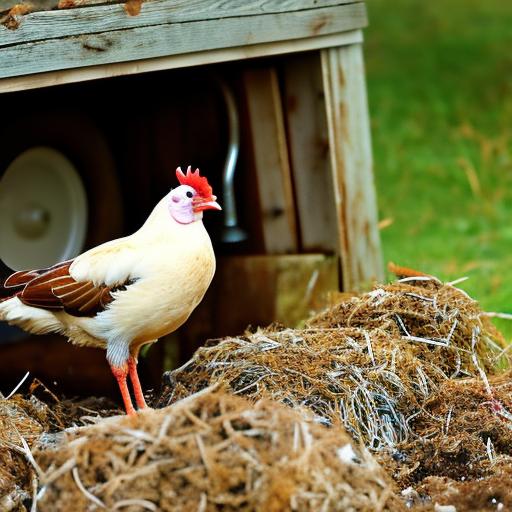Keeping chickens has become increasingly popular in recent years, and for good reason. Not only do chickens provide a sustainable source of fresh eggs, but they also offer a range of other benefits. They can help control pests in your garden, provide natural fertilizer for your plants, and even serve as friendly and entertaining pets. If you’re considering raising chickens in Highlands County, Florida, you’re in luck. The county’s warm climate and rural setting make it an ideal location for keeping chickens.
Highlands County is located in central Florida and is known for its agricultural heritage. With its mild winters and hot summers, the county provides an ideal environment for raising chickens. The warm climate allows for year-round egg production, and the abundance of open space makes it easy to create a suitable habitat for your flock. Additionally, Highlands County has a strong community of chicken enthusiasts who can offer support and advice to new chicken keepers.
Key Takeaways
- Keeping chickens in Highlands County can be a rewarding and sustainable hobby.
- It is important to be aware of the legal considerations and regulations for keeping chickens in the area.
- Choosing the right breed of chicken for the climate and environment is crucial for their health and productivity.
- Adequate housing and shelter, including protection from predators, is necessary for the well-being of the chickens.
- Providing a balanced diet and proper nutrition is essential for egg production and overall health of the chickens.
Legal considerations for keeping chickens in Highlands County
Before you start raising chickens in Highlands County, it’s important to familiarize yourself with the local laws and regulations regarding poultry keeping. Zoning laws may dictate whether or not you can keep chickens on your property, so it’s essential to check with your local zoning department to ensure compliance. In some cases, you may need to obtain a permit or license to keep chickens.
In addition to zoning laws, noise ordinances may also come into play when keeping chickens. While most chickens are relatively quiet, roosters can be noisy, especially in the early morning hours. Some areas may have restrictions on keeping roosters due to noise concerns, so it’s important to be aware of these regulations before bringing home any male birds.
Choosing the right breed of chicken for Highlands County
When selecting a breed of chicken for your Highlands County flock, there are several factors to consider. First and foremost is the climate. The hot and humid summers in Highlands County can be challenging for some chicken breeds, so it’s important to choose a breed that is heat-tolerant. Some heat-tolerant breeds include the Rhode Island Red, Sussex, and Leghorn.
Another important consideration is egg-laying ability. If you’re primarily interested in raising chickens for their eggs, you’ll want to choose a breed that is known for its high egg production. Breeds such as the White Leghorn, Golden Comet, and Australorp are known for their prolific egg-laying abilities.
Finally, temperament is an important factor to consider when choosing a breed. Some breeds are more docile and friendly, while others can be more flighty or aggressive. If you have children or plan to interact with your chickens frequently, it’s best to choose a breed that is known for its friendly disposition, such as the Orpington or Wyandotte.
Housing and shelter requirements for chickens in Highlands County
Providing adequate housing and shelter is essential for the health and well-being of your chickens. In Highlands County’s warm climate, it’s important to provide a coop that offers protection from the sun and heat. The coop should be well-ventilated to allow for air circulation, but also provide shade and insulation to keep the chickens cool.
The size of the coop will depend on the number of chickens you plan to keep. As a general rule of thumb, each chicken should have at least 4 square feet of indoor space in the coop. Additionally, you’ll need to provide outdoor space for your chickens to roam and forage. A secure run or fenced-in area is necessary to protect your flock from predators.
Inside the coop, you’ll need to provide nesting boxes for your hens to lay their eggs. Each hen should have her own nesting box, which should be filled with clean bedding material such as straw or wood shavings. Additionally, roosting bars should be provided for the chickens to perch on at night.
Feeding and nutrition for chickens in Highlands County
Proper nutrition is essential for the health and productivity of your chickens. A balanced diet will ensure that your chickens lay high-quality eggs and maintain good overall health. The majority of a chicken’s diet should consist of a commercial poultry feed that is specifically formulated for their nutritional needs.
In addition to their regular feed, chickens can also benefit from supplemental treats. These can include kitchen scraps, fruits, vegetables, and even insects. However, it’s important to avoid feeding your chickens anything that is toxic or harmful to them, such as chocolate, onions, or avocado.
Water is another important component of a chicken’s diet. Chickens require fresh, clean water at all times. In the hot climate of Highlands County, it’s especially important to provide ample water to prevent dehydration. Consider using a waterer with a built-in heater during the winter months to prevent freezing.
Health and disease management for chickens in Highlands County

Keeping your chickens healthy is crucial for their well-being and productivity. There are several common diseases that can affect chickens, including respiratory infections, parasites, and viral diseases. It’s important to be proactive in preventing these diseases through proper biosecurity measures.
Biosecurity measures include keeping your coop clean and free from feces and other debris, quarantining new birds before introducing them to your flock, and practicing good hygiene when handling your chickens. Regularly inspecting your flock for signs of illness and promptly treating any sick birds can help prevent the spread of disease.
If you do encounter a health issue with your chickens, it’s important to consult with a veterinarian who specializes in poultry health. They can provide guidance on treatment options and help you develop a plan for preventing future outbreaks.
Egg production and management in Highlands County
One of the main reasons people choose to raise chickens is for their fresh eggs. Maximizing egg production requires a few key strategies. First, ensure that your hens have a balanced diet and access to clean water at all times. A high-quality layer feed will provide the necessary nutrients for egg production.
Collecting and storing eggs properly is also important for maintaining their freshness and quality. Eggs should be collected daily and stored in a cool, dry place. It’s best to store them with the pointed end down to help maintain their freshness.
If you have more eggs than you can consume, selling them can be a great way to offset the cost of keeping chickens. However, it’s important to check with local regulations regarding the sale of eggs. Some areas may require a permit or license to sell eggs, and there may be specific labeling requirements.
Tips for raising chickens in Highlands County
Raising chickens can be a rewarding experience, but it does require some effort and attention. Here are a few tips to help you successfully raise chickens in Highlands County:
1. Socialize your chickens: Spend time with your chickens regularly to help them become comfortable around humans. This will make handling and care easier.
2. Keep the coop clean: Regularly clean out the coop and remove any soiled bedding or waste. This will help prevent the buildup of bacteria and parasites.
3. Provide entertainment: Chickens are curious creatures and enjoy having things to explore and peck at. Consider providing them with toys or hanging treats to keep them entertained.
Potential challenges and solutions for keeping chickens in Highlands County
While raising chickens in Highlands County has many benefits, there are also some potential challenges to consider. One of the main challenges is predators. In rural areas, predators such as raccoons, foxes, and snakes can pose a threat to your flock. To protect your chickens, make sure your coop is secure and predator-proof. Use sturdy fencing and consider installing an electric fence or motion-activated lights to deter predators.
Extreme weather conditions can also be a challenge in Highlands County. The hot summers can be stressful for chickens, so it’s important to provide shade and plenty of fresh water. During the winter months, you may need to provide additional heat sources to keep your chickens warm.
Finally, it’s important to be considerate of your neighbors when keeping chickens. While most chickens are relatively quiet, roosters can be noisy. If you live in a residential area, check with your neighbors to ensure they are comfortable with the noise level. If necessary, consider keeping only hens or finding a new home for any noisy roosters.
Is keeping chickens in Highlands County right for you?
Keeping chickens in Highlands County can be a rewarding and enjoyable experience. The benefits of fresh eggs, natural pest control, and the joy of interacting with these friendly creatures make it a popular choice for many residents. However, it’s important to carefully consider the legal requirements, housing and shelter needs, and potential challenges before getting started.
If you’re interested in raising chickens in Highlands County, take the time to do further research and reach out to local chicken enthusiasts for advice and support. With proper planning and care, you can create a thriving flock that will provide you with years of enjoyment and fresh eggs.
If you’re wondering about keeping chickens in Highlands County, you might also be interested in learning about the mating season for turkeys. Poultry Wizard has a helpful article that explains the intricacies of turkey breeding and how to successfully navigate the mating season. Understanding this process can be beneficial if you plan on raising turkeys alongside your chickens. Check out the article here to gain valuable insights into turkey breeding.
FAQs
What is Highlands County?
Highlands County is a county located in the U.S. state of Florida. It is situated in the central part of the state and has a population of approximately 100,000 people.
Is it legal to keep chickens in Highlands County?
Yes, it is legal to keep chickens in Highlands County. However, there are certain regulations and guidelines that must be followed, such as obtaining a permit and adhering to zoning laws.
How many chickens can I keep in Highlands County?
The number of chickens that can be kept on a property in Highlands County varies depending on the size of the property and the zoning laws in the area. Generally, a maximum of six chickens is allowed per acre of land.
What are the requirements for keeping chickens in Highlands County?
To keep chickens in Highlands County, you must obtain a permit from the county and adhere to certain guidelines, such as providing adequate shelter, food, and water for the chickens. Additionally, the chickens must be kept in a secure enclosure to prevent them from wandering onto neighboring properties.
What are the benefits of keeping chickens in Highlands County?
Keeping chickens in Highlands County can provide a source of fresh eggs and meat, as well as fertilizer for gardens. Additionally, chickens can be entertaining and educational pets for children and adults alike.
What are the potential drawbacks of keeping chickens in Highlands County?
Some potential drawbacks of keeping chickens in Highlands County include noise, odor, and the potential for attracting predators such as raccoons and coyotes. Additionally, chickens require daily care and maintenance, which can be time-consuming and labor-intensive.
Meet Walter, the feathered-friend fanatic of Florida! Nestled in the sunshine state, Walter struts through life with his feathered companions, clucking his way to happiness. With a coop that’s fancier than a five-star hotel, he’s the Don Juan of the chicken world. When he’s not teaching his hens to do the cha-cha, you’ll find him in a heated debate with his prized rooster, Sir Clucks-a-Lot. Walter’s poultry passion is no yolk; he’s the sunny-side-up guy you never knew you needed in your flock of friends!







